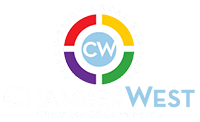Don't Let the Fear of Failure Keep You From Launching Your Small Business
So you want to be your own boss, huh? That's great! You can join the ranks of the millions who answer to themselves and forge their own paths.
We know it's a given that starting a new business is a significant endeavor, and there are a lot of unknowns and a lot of risks. It's perfectly natural to feel some fear when embarking on such a big undertaking. But don't let that fear stand in your way of achieving your dreams! To help you take the leap, we share some tips from the ChamberWest Chamber of Commerce that can pave the way for you to launch your small business.
Understand the Costs
One of the first steps you need to take when starting a new business is to determine your startup costs. This will give you a good idea of how much money you need to get your business off the ground. Office space, software, inventory, equipment, supplies, licenses, permits ... it all adds up quickly. Once you have a number in mind, you can start saving up or look into financing options.
Write Up a Business Plan
Developing a business plan is an important step for any new business. It can help you to establish your goals and objectives, as well as provide a roadmap for your business. It starts by researching your industry and target market. This will help you to understand the needs of your potential customers and how to best serve them.
You'll also need to outline your business model. What are the key components of your business? How will you generate revenue? What are your costs? Once you have a clear understanding of your business, start writing your plan. Begin with an executive summary, which should provide an overview of your business. Then, flesh out the details in each section of your plan. Be sure to include financial projections and marketing strategies.
Select a Business Structure
You'll also need to determine a business structure. The most common choices are sole proprietorship, LLC and corporation. LLCs offer flexibility and personal liability protection, making them a popular choice for small businesses. Sole proprietorships are less complex and easier to set up, but they offer no protection from personal liability. And corporations offer limited liability protection and a more complex structure, making them a good choice for larger businesses. Ultimately, the right business designation depends on your individual needs and circumstances.
Prepare to Market Your Business
Once you have your business structure in place, it's time to start marketing your products or services. This can be done through various channels like social media, content marketing, email marketing, and more. Developing a solid marketing strategy will help you reach your target audience and grow your customer base. But if you need help, consider hiring a freelance marketing specialist to help you get things set up. They will likely send you content in PDF form, so you might want to convert the file type into something more edit friendly. In order to convert PDF to doc, just add it to a free online editing tool, select the new file type, and click Convert. You will then have a file you can easily edit before returning it to your freelancer for final edits.
Find Yourself a Mentor
Starting a new business can be overwhelming, so Foundr explains that it's important to have someone you can look up to for advice and guidance. Connecting with a mentor who has already been through the process can be incredibly helpful. They can offer advice, answer questions, and provide support when you need it most.
Highlight Your Goals
When starting a new business, it's important to set realistic goals that you can actually achieve. According to Asana, trying to accomplish too much too soon is one of the biggest mistakes you can make. Start small and gradually work your way up to bigger goals as your business grows.
Grow Your Network
Last but not least, don't forget to network! Get involved with trade associations or attend industry events. This is a great way to meet potential customers, partners, or investors. It's also an opportunity to learn more about your industry and stay up-to-date on current trends.
Make a Plan to Succeed
When you have the right strategies, the fear of starting your own business shifts into excitement. By following these tips, you'll be well on your way to overcoming the fear that comes with starting a new business! Just remember to take things one step at a time and always keep moving forward. And use whatever resources you need, whether they are online tools, a freelancer, or networking events to get your motivation - and your confidence - up!
Connect with and learn from other local business leaders by joining the ChamberWest Chamber of Commerce.

